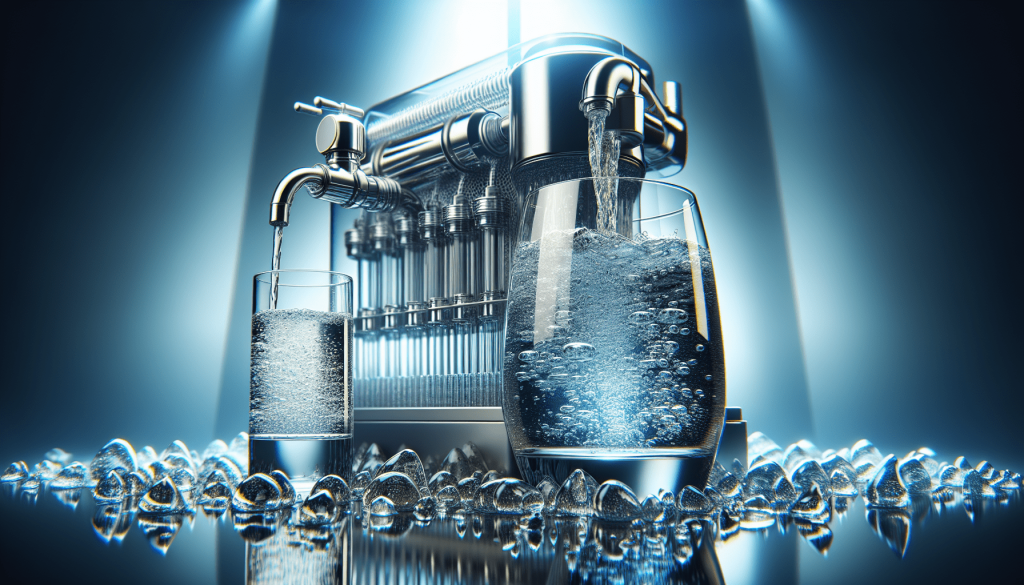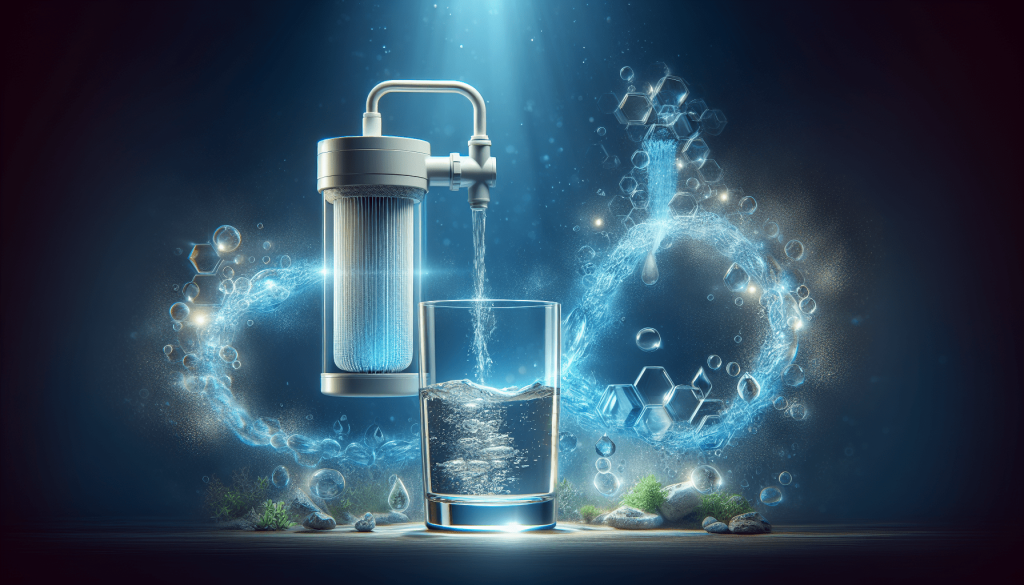Imagine standing in the beverage aisle of your local grocery store, faced with endless options of bottled water. You want to make the best choice for your health, but you find yourself hesitating between purified and filtered water. Which one should you go for? In this article, we will explore the benefits and differences of purified and filtered water, helping you make an informed decision that quenches your thirst while nourishing your body.
Definition of purified water
Purified water refers to water that has undergone a process to remove impurities and contaminants, resulting in a higher level of purity. This process typically involves removing substances such as bacteria, viruses, minerals, chemicals, and other impurities that may be present in tap water. Purified water is commonly used for drinking, cooking, and various other applications where high-quality water is required.
Methods of purifying water
There are several methods used to purify water, each with its own advantages and disadvantages. Some common methods include:
-
Distillation: This process involves boiling water and then collecting the condensed steam, leaving behind impurities. Distillation is effective at removing most contaminants but can be time-consuming and requires specialized equipment.
-
Reverse Osmosis: Reverse osmosis uses a semi-permeable membrane to remove impurities from water. It is effective at removing a wide range of contaminants, including bacteria, viruses, and minerals. However, it can be costly and may also remove beneficial minerals.
-
Ion Exchange: This method involves passing water through resin beads that exchange ions, effectively removing minerals and other impurities. Ion exchange is commonly used to soften water but may not remove all types of contaminants.

Benefits of purified water
Choosing purified water can offer a range of benefits, including:
-
Removal of a wider range of contaminants: Purified water undergoes rigorous purification processes, ensuring the removal of various impurities, including bacteria, viruses, chemicals, and minerals.
-
Elimination of harmful bacteria and viruses: Purified water treatments, such as distillation and reverse osmosis, effectively remove harmful microorganisms, ensuring safer drinking water.
-
Enhanced taste and odor: Purified water often has a clean, refreshing taste due to the removal of chemicals and impurities that can affect the flavor and smell of tap water.
Definition of filtered water
Filtered water refers to water that has been passed through a filter to remove impurities. Unlike purified water, filtration focuses on removing larger particles and contaminants, while allowing beneficial minerals to remain in the water. Filters capture sediment, chlorine, and other substances that can affect the taste and quality of water.

Methods of filtering water
Various methods can be used to filter water, depending on the specific needs and preferences. Some common methods include:
-
Carbon filtration: This method involves passing water through activated carbon filters, which effectively remove chlorine, sediment, and organic compounds. Carbon filters can greatly improve taste and odor.
-
Ceramic filters: Ceramic filters consist of small pores that trap contaminants as water passes through. They can effectively remove bacteria and sediment, providing cleaner water.
-
UV filters: Ultraviolet (UV) filters use UV light to kill bacteria, viruses, and other microorganisms by damaging their DNA. This method can be effective at purifying water but may not remove other types of contaminants.
Benefits of filtered water
Filtered water provides several benefits, including:
-
Maintenance of essential minerals: Unlike the purification process, filtration does not remove beneficial minerals naturally present in water. These minerals, such as calcium and magnesium, contribute to the overall health benefits provided by water.
-
Improved taste and odor: Filtration can greatly enhance the taste and smell of tap water by removing chlorine, sediment, and other impurities that may affect its quality.
-
Easier and cheaper to obtain: Compared to purifying water, obtaining filtered water is often more convenient and cost-effective. Filtered water can be obtained through various methods, such as using water filter pitchers, faucet-mounted filters, or refrigerator filters.

Differences between purified and filtered water
When comparing purified and filtered water, there are several key differences to consider:
Method of removing impurities
Purified water uses processes like distillation and reverse osmosis to remove impurities, while filtered water relies on physical filtration methods like activated carbon or ceramic filters.
Types of contaminants removed
Purified water removal processes are designed to eliminate a wide range of contaminants, including bacteria, viruses, chemicals, and minerals. Filtered water mainly focuses on removing particles, sediment, chlorine, and organic compounds.
Effect on taste and odor
Purified water processes often result in cleaner and fresher-tasting water, as chemicals and impurities that can affect taste and odor are removed. Filtered water also improves taste and odor by removing chlorine and other substances, but some minerals may still be present, providing a slightly different taste.
Cost of purification/filtration systems
Purification systems, such as distillation or reverse osmosis, can be more expensive to install and maintain compared to filtration systems. Filters used for water filtration are generally more affordable, but they require regular replacement to maintain effectiveness.
Advantages of purified water
Opting for purified water offers several advantages:
-
Removes a wider range of contaminants: Purification methods like distillation and reverse osmosis are highly effective at eliminating a broad spectrum of impurities.
-
Can eliminate harmful bacteria and viruses: Purified water treatments ensure the removal of potentially harmful microorganisms, providing safer and healthier drinking water.
-
Enhances taste and odor: By eliminating chemicals and impurities, purified water often has a cleaner and more refreshing taste compared to tap water.

Disadvantages of purified water
Despite its benefits, purified water has some potential drawbacks:
-
May remove beneficial minerals: Purification methods like distillation and reverse osmosis can eliminate minerals that are naturally present in water. While these minerals can be obtained from other sources, some individuals prefer drinking water that retains them.
-
Requires specialized equipment: Purification systems may require specific equipment installations, such as distillers or reverse osmosis units. These systems can be expensive to purchase and maintain.
-
May be more expensive: Due to the complexity of the purification processes and the cost of specialized equipment, purified water can be more expensive compared to tap water or filtered alternatives.
Advantages of filtered water
Choosing filtered water provides several advantages:
-
Maintains essential minerals: Unlike purification methods, filtration does not remove beneficial minerals present in water. These minerals contribute to overall health and can be retained through filtration.
-
Improves taste and odor: Filtered water goes through physical filtration processes that remove chlorine, sediment, and other impurities, ensuring a better taste and odor.
-
Easier and cheaper to obtain: Filtered water is more accessible, with various options like water filter pitchers, faucet-mounted filters, or fridge filters. These options are often more cost-effective compared to purification systems.

Disadvantages of filtered water
However, filtered water does have its limitations and potential drawbacks:
-
May not remove all contaminants: While effective at removing sediment, chlorine, and certain particles, filters may not eliminate all types of contaminants present in tap water. It is essential to choose the appropriate filter for the contaminants you are concerned about.
-
Possibility of bacterial growth: If not properly maintained, filters can become a breeding ground for bacteria. Regular maintenance and replacement are necessary to ensure the continued effectiveness and safety of filtered water.
-
Filters need regular maintenance: Filters require periodic replacement to maintain their efficiency. This ongoing maintenance adds to the overall cost and convenience considerations.
Considerations for choosing between purified and filtered water
When deciding between purified and filtered water, several factors should be taken into consideration:
Quality of tap water
Assessing the quality of your tap water is crucial. If your tap water has high levels of contaminants or if you are unsure about the quality, a more comprehensive purification method may be necessary. However, if your tap water is relatively clean and safe to drink, a filtration system may be sufficient.
Specific contaminants present
Identifying the specific contaminants you wish to remove is essential in determining the appropriate method. Certain purification processes may be more effective at removing particular contaminants, while filtration methods may target others. Understanding the contaminants present in your water will help in making an informed decision.
Budget and cost
Consider your budget and cost considerations. Purification systems often come with a higher initial investment and ongoing maintenance costs. Filtered water solutions, on the other hand, are generally more affordable and accessible, with a range of options available for different budgets.
Conclusion
Ultimately, the choice between purified and filtered water depends on personal preference, specific needs, and the quality of your tap water. Both options offer benefits, and consulting with a water specialist can provide valuable insights tailored to your circumstances.
Understanding the differences between these methods, as well as the advantages and disadvantages they present, will empower you to make an informed decision about the water you consume. Whether you opt for purified water or filtered water, the goal remains the same – to ensure access to safe and high-quality drinking water for you and your loved ones.


